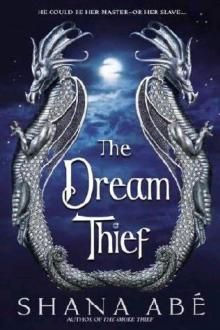The Dream Thief Read online
Page 2
“Yes,” she said flatly. “I know.”
She shook free of his grip, turned to the birdcage, and snapped open the door. There came a flurry of peeps and rustling; when she straightened again, there was a dark lump in her fist.
“To the drákon,” Amalia said, and broke the wren’s neck.
Her fingers opened. The little bird landed beside her shawl, one wing arced in an angel fan across the tassels.
“You have to do both,” managed Rhys, into the sudden hush.
Without a word, Lia stuck her hand into the cage and retrieved the other wren.
Another rush of invisible wind sliced over them, clattering the leaves. She flung the second bird up after it, where it flapped and fluttered and skimmed off in a drunken line, vanishing into the night.
Lia shot a look at Kimber, chin tilted. “I suppose I’ll only ever be half as good as you, after all,” his little sister said, and with her skirts in her hands she pelted down the path that led back to Chasen Manor.
Changeling, Kim thought, watching her go. Definitely.
Once, years ago, Lia had asked her mother if she heard the song.
“The supper chime?” Rue Langford had asked, tucking her daughter into bed.
“No, Mama. The other song. The quiet one.”
“The quiet one. The music box from your father?”
“No. The other song.”
And Mama had gazed down at her with her lovely brown eyes, her head tilted, a smile on her lips. She and Papa were hosting a fête that evening for the members of the council and their wives. Her skirts were ivory and cream; she smelled of flowers and soap and the silvery dust of hair powder. She wore pearls that thrummed with a low, gentle melody, simple, like a hymn. Lia reached out and ran her fingers over the bracelet.
“I’m afraid I don’t know what song you mean, beloved.”
“That one…”
Audrey was already out of the nursery, but Joan was in the bed against the other wall, sulking because she wasn’t yet old enough to attend the fête.
“She says she hears a song all the time,” said Joan in a very bored, grown-up voice.
Mama’s look sharpened. “What sort of song?”
“A quiet one. You know…like the wind in a meadow. Like the ocean.”
Rue’s expression relaxed. “Oh. Yes, I hear that sometimes too.”
“You do?”
“I do. Nature plays a wonderful symphony for us.”
“No, not nature. It’s a song.”
Rue placed the back of her fingers upon her daughter’s forehead. Her skin felt very cool. “Can you hum it?”
“No.”
“Does it bother you? Does it hurt your head?”
“No…”
“It’s not even real,” said Joan loudly in her bored voice. “If it was real, we’d all hear it. We can hear everything.”
“It is real to your sister,” answered Mama, firm, and looked back at Lia. “You must tell me if it ever starts to fret you. Come to me, and I’ll fix it.”
Lia sat up in her bed, wide-eyed, interested. Rue was powerful, the most powerful female of the tribe, but Lia had no idea her mother’s Gifts were that strong.
“How, Mama?”
“Why, I’ll love it away, just like this,” said Rue, laughing as she caught Lia by the shoulders and pressed rose-petal kisses all over her cheeks.
That was how Amalia knew that her mother didn’t believe her either.
When the dreams began to surface a few years after that, Lia didn’t bother to tell anyone. The song, for all its persistence, held a certain sadness and distance that made it seem almost innocent. But there was nothing of innocence in the blind dreams. In them she was another person…older. Enigmatic. She woke from them flushed and panting, guilty and excited and miserable at once. She wouldn’t share those feelings with anyone, not even her mother.
At first they were fragments, just voices and sentences that seemed strung together without reason. She could hear herself speaking in them, but what she said made no sense. She could hear the man’s voice, but it was as though he was far away from her, talking through a rainstorm. She caught only snatches of words.
Yet the dreams had grown clearer. And clearer. And with them, a rising sense of danger, a warning that pushed down on her chest and prickled the hair on her arms.
Nothing truly terrible ever happened in the blind dreams. At the same time, she knew that somehow they meant everything terrible. She spoke of stealing and killing and the loss of her parents as if reciting a list for the village market. It was not pretend. But in that humming, welcome dark, Lia felt nothing wrong at all.
A few months past, in the gray morning hours of her fourteenth birthday, the dream had revealed for the first time who the man was.
Zane. Zane the Other, Zane the criminal. Zane, former apprentice of the Smoke Thief herself, now the tribe’s hired hands and eyes and ears in the real world, the world beyond Darkfrith.
And tonight, even though she had run as fast as she could in her hoops and heels, she had missed his carriage. By the time she’d made it past the forest break and onto the front lawn, she couldn’t even see the smudgy glow of its rear lanterns. There was only the faint squeak of metal and wood and the clip-clop of hooves fading off into the hills.
That-and the song. Thin and eerie and sweet, it beckoned from the farthest thread of the eastern horizon. It always beckoned.
Deliberately, she turned her back to it. It haunted her days and nights; it haunted her soul; and the fact that no one heard it but her was something Amalia never liked to consider.
She found herself gazing at the warm, handsome windows of Chasen Manor, set back against the forest and lawn like a perfect painting of country peace. At the figures moving inside, supper being laid, beds turned down, evening fires stoked, everything as ordinary as could be.
Something new flashed in the sky above her head, twisting, bright as a scythe with the rising moon; it dropped swiftly into the woods.
With her arms hugged to her chest, Lia watched it fall.
She’d be called in soon. She needed a plan.
The London air hung heavy with soot and a wet, cool fog, clinging to his face like an unpleasant skin, dampening his breath. But he was used to it; in fact, he usually welcomed it, because foggy nights meant fewer shadows. In his business, light and shadow were as important as picklocks and poison and knives.
The only thing Zane truly disliked about the fog was what it did to gunpowder. He’d never found a brand that didn’t lump into muck in humid weather.
From the hours outdoors, his hair had worked loose from its queue, unfashionably long, distinctive. It would be dark against his skin and the dull white of his cravat. He should have worn a wig. A wig, a cheaper hat, a plainer greatcoat: it would have been more anonymous. But what was done was done; he wasn’t a man to linger long in regret. The people he’d cornered these past few days were paid too damned well to remember his face, anyway.
At least tonight was over. Tomorrow he’d start again, but right now he was hungry, he was tired, and he was very much looking forward to a meal and his bed-and what awaited him in that bed.
The candle lantern just past his house burned sulfur-yellow, a very dim sun choked with mist. None of the small, neatly spaced houses he passed were even visible through the gloom. He found his way because he’d always known it, because he’d lived here since he was a child and had mapped the streets and pavements and gutters in his mind so well he knew every alley, every door, every possible route of escape.
He made himself part of the night. He made his footsteps silent, his breathing imperceptible. He listened to the dark so intently it sounded like his own heartbeat, familiar and calm.
This was his realm, for better or worse. This was the place he claimed and defended, a tiny, ragged patch of safety in the midst of chaos.
And so in the back of his mind, past his awareness of the fog and the candle lantern and the muffled thumps and
groans of the city, Zane was counting off his steps.
Twenty-two, twenty-three… there would be an oil lamp flickering in the front window of Madame Dumont’s two-story, for the wastrel son who whored away half the night.
Thirty-seven, thirty-eight… step over the exposed root of the elm that had finally cracked the pavement into halves.
Forty-five. The black cat watching from the roof of Lucy Brammel’s.
Forty-seven. The loosened trellis the cat used to climb to the roof; Zane had pulled it free of the chimney last January to see if it would hold his weight-it wouldn’t-and Lucy still hadn’t noticed.
Fifty-one.
He paused, another reflex. Fifty-one marked his first step onto his property. Too many men relaxed when they reached their own doors. It was one of the easiest places to make a kill.
But Zane was not like other men. He wasn’t like anyone else on this clean, comfortable street, and it was one of the things he appreciated most about Bloomsbury. Despite being a neighborhood of actors and artisans, the truth was that everyone here was rigorously, predictably, church-squeaky good.
Another advantage to a man who lived in disguise: it made his sort stand out all the more.
He slipped around to the back of his house, evading all the traps he’d set, finding the short rise of stairs through the clouded darkness and then the keyhole to the kitchen door.
Joseph was waiting inside. He was seated at the side table, eating a bowl of something that smelled like very bad eel.
“Late,” he grunted, by way of a greeting.
Zane removed his cocked hat, running a hand through his hair. “Whatever it is you are consuming, I do not want it served at my table tonight. Or any other night.”
The man’s brows arched; past his scars and badly mottled skin, he looked pained. “It’s me mum’s recipe.”
“Then she is welcome to my portion.” He bolted the kitchen door closed once more, had worked the top buttons of his coat free and was heading for the hall, for bed, when he was halted by his front man’s voice.
“Got a visitor.”
“I know.”
“Not Mim.”
Zane slanted a look back at him. Joseph shrugged. “A girl. Put her in the parlor.”
“A girl,” he repeated slowly. “Are you certain?”
“Aye,” answered Joseph, with exaggerated care. “I’m certain.”
Zane turned again and silently left the kitchen.
His house was dark. He’d grown up with it this way and kept it as a useful habit. A house ill-lit on the inside revealed much less of its inhabitants; he nearly always preferred to see and be unseen. But Joe had apparently felt the girl in question required a great deal of illumination. When Zane stopped at the arched doorway to the parlor, he saw that every lamp was burning, plus the pair of candelabras from the dining room. The contrast was almost like daylight: the reds and blue-greens of the Peshawar rug searing bright, the carved corners of the paintings rubbed with gilt, the gleam of the satinwood chairs eye-wateringly sharp.
The child slumped aside in one of them, head back, eyes closed, lips apart. There was a half-filled cup of chocolate tilting precariously on her lap, her fingers still curled around the handle. Her frock was girlish blue sprigged with daisies, her pumps were dirty, her hair was mussed. Limp ringlets of darkened gold fell softly against her cheeks. She looked pale and gaunt and remarkably plain, despite the beauty of that hair. Everything smelled of hot wax and honey.
He stood there and felt, to his distant surprise, none of the anger he had expected but instead a profound sense of relief.
To manage it he took the cup from her fingers and gave the chair a hard kick.
She came awake at once, straightening, her hands fluttering across her skirts.
“Lady Amalia. I wish I could say I was happy to see you, but I’ve already endured the pleasure of the Marquess of Langford’s company thrice in the past two days. What the devil are you about?”
“Father’s here?” she asked, looking around them.
“Not at the present. No doubt it won’t be long before he returns. I don’t believe he’s fully convinced I haven’t hidden you away somewhere in the house. Imagine my joy,” he added silkily, “at walking into my parlor tonight and discovering it to be true.”
“I’m sorry. I…” She trailed off, shaking her head, then covered her eyes with one hand. “I haven’t been sleeping well.”
“Perchance it has something to do with the fact that you’ve been riding in a public coach for-let me see-almost a fortnight, isn’t it? That’s about how long it takes to travel from Darkfrith to my door by stage. Unless, I suppose,” he paused, “you flew here.”
He hadn’t meant it as a barb, but she grimaced, just a little. Then her hand lowered; she gazed at him steadily.
“I didn’t fly. You know I can’t. And that’s not why.”
Zane didn’t like that look, long-lashed, brown-eyed, direct. It reminded him too much of her mother. They stared at each other in the growing silence. Amalia’s lips slowly compressed into a thin, stubborn line.
With a sigh he gave it up, lowering himself into the opposite chair. He glanced down at her cold chocolate and then tried a taste, feeling his stomach rumble. Hell was going to cut loose sooner or later, and he’d already missed supper.
The drákon did not take kindly to losing one of their kind. He knew that too bloody well.
Lamplight glinted silver along the scrolled edge of a tray beside him. Saints be praised, Joseph had left her food. Scones, orange cake, a dish of honeyed nuts and dried fruits-he leaned forward and helped himself to half an apricot and a sliver of cake.
“Bad dreams, snapdragon?”
“Yes.” It was a miserable whisper.
“How unfortunate. I’m certain it was worth fleeing your home without a word to anyone-without, I am equally certain, permission from your almighty drákon council-to come here to tell me.”
But she still didn’t avert her gaze. She didn’t even seem abashed. All her initial, drowsy confusion appeared completely vanished. She looked cool and composed and very much older than her years, even in her wrinkled skirts. Whatever it was that had compelled her halfway across the kingdom was well hidden behind that mask of mulish calm.
Very well. He knew how to wait.
Zane downed the apricot and crumbled the cake into pieces, consuming each mouthful with purposeful leisure. Joseph was thick-witted and slow and strictly as loyal as his next paycheck, but the true reason Zane kept him in his home was this. Cake. Scones. Fresh berry pies. He was the best hand at sugar pastries this side of the Channel, and the starving child Zane had once been fully appreciated his skills. By the force of his nature Zane remained a hammered blade; fat men never made good thieves. He survived on bites and water and potfuls of bitter coffee. But he was on his third slice before Amalia rose, taking back her cup from his hand.
She made a slow circle of the room, not drinking. “This doesn’t seem much like the residence of a notorious criminal.”
“No. That’s rather the point.”
“Is that why Mother gave it to you?”
“Pardon me,” he retorted, brushing the crumbs from his waistcoat, “she did not give it to me. I purchased it from her, and at a damned premium price. It was all extremely legitimate.”
“Oh.”
“Yes, oh.”
She set the chocolate on the windowsill. She lifted a hand to the iron bolt holding the shutters closed.
“Do not, if you please,” he said curtly, unmoving. “I’d prefer not to invite your kith and kin inside at the moment.”
“It isn’t sealed?”
“The molding around one of the panes has come loose. I discovered that the hard way two days ago.”
Her fingers jerked back as if burned. It was only one loosened pane, nothing very helpful to the ordinary men and thugs who usually haunted him, a mere breath of space between the solder and the glass. Yet it was all Christoff Langford h
ad needed to breach all of Zane’s careful defenses. Because Langford, of course, wasn’t a man at all. He wasn’t even human.
And neither was his daughter.
“You love my family,” Amalia said now, her back to him, rubbing her palm up and down her rumpled blue-and-flowered skirts.
He did not reply.
“Some of them, anyway.” She glanced at him from over her shoulder. “You do love some.”
“If you say so.”
“You know what we are,” she persisted. “You’ve helped us, over the years. You’re…close to my parents. You’ve aided the tribe.”
“That wasn’t for love, I assure you.”
“What was it, then? Only money?”
“Money is a subject very dear to my heart, child. Do not underestimate it.”
“And what of power?” she asked, softer. “Is that dear to you as well?”
“Did you venture all this way for an examination of my character, snapdragon?”
Lia turned and looked him fully in the face. She didn’t like his pet name for her, and never had. It sounded whimsical, childish, when everything inside her felt strong and cold.
But she knew what he thought of her. She’d always known.
He was the only mortal tolerated by the tribe. He was the only one suffered to keep their secrets. While she and all her kind were kept trapped in the green heaven of Darkfrith, Zane was the sole living creature allowed to come and go at will. Even her father, the Alpha, tended to inform the council when he meant to travel.
It was their way. She knew it was how they had survived all these centuries. The Others raised livestock, or crops. The drákon raised silence, year after year after year.
Lia was the daughter of a lord. She lived in a mansion of glimmer and light; she looked out her bedroom window every day at open skies and wild, wooded hills and sometimes felt so suffocated it was a wonder she didn’t open her mouth and start screaming and never stop.
The council gave lectures to the children in the village:
Of all the world, we are the last of our kind.
It is our duty to remain safe.

 The Second Mrs. Astor
The Second Mrs. Astor The Treasure Keeper
The Treasure Keeper The Deepest Night
The Deepest Night The Treasure Keeper d-4
The Treasure Keeper d-4 The Time Weaver d-5
The Time Weaver d-5 The Time Weaver
The Time Weaver The Smoke Thief
The Smoke Thief The Sweetest Dark
The Sweetest Dark The Dream Thief
The Dream Thief The Deepest Night tsd-2
The Deepest Night tsd-2 A Rose in Winter
A Rose in Winter Queen of Dragons d-3
Queen of Dragons d-3 The Smoke Thief d-1
The Smoke Thief d-1